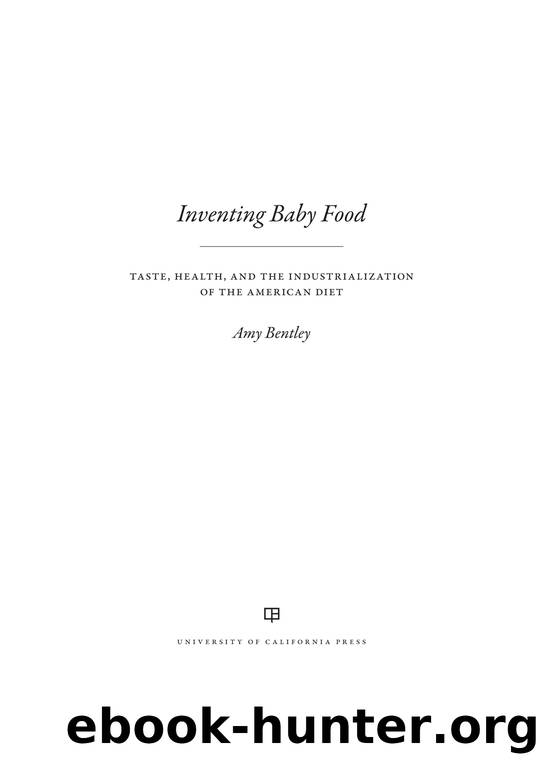Inventing Baby Food by Amy Bentley

Author:Amy Bentley
Language: eng
Format: epub
ISBN: 9780520283459
Publisher: University of California Press
CRITICAL OFFENSIVE: BABY’S FIRST “JUNK FOOD”
The homemade baby food movement was in part a reaction to what consumer activists perceived as inaccurate and misleading information on product labels. A strong component of the consumer movement in general, and baby food activism in particular, was a push for open expiration dating. The food industry fought fiercely against open expiration dating, arguing that it would lead to increased food costs and “needless rejection of food based on date of expiration.”65 Although baby food manufacturers included expiration dates of products on their labels, these dates were generally written in a code not meant for the consumer to decipher. After Representative Henry Waxman of California, in a hearing, held up jars of baby food found on grocery store shelves with coded expiration dates that were three and four years old, Congress in 1972 passed a bill to ban the code dating of fresh food and canned or bottled baby foods. According to a newspaper report of the incident, “a representative of the manufacturer admitted of the can in Waxman’s hand, ‘It would probably be better not to eat it.’”66
There was also a push for more accurate labeling of ingredients. Many compared the baby food label regulations with the much stricter rules for pet food labeling. “Highly processed foods make it difficult for the consumer to figure out what is in them or to recognize deception,” wrote nutrition professionals Roslyn B. Alfin-Slater and Derrick B. Jelliffe. “Water is first ingredient listed but we don’t know if product is 90 percent water or 30 percent water. Pet food, by contrast, must list on its labels the percentages of each ingredient.”67
The criticisms reached a climax in 1975, with the release of a “White Paper on Infant Feeding Practices” by the Center for Science in the Public Interest (CSPI). The white paper, developed by the Citizens’ Committee on Infant Nutrition, a twelve-member panel made up of medical doctors, public health officials, and children’s advocates, summarized the criticisms that had been mounting over the previous few years. The results were a decidedly critical stance toward the infant food industry. “Infant feeding practices in the United States,” began the document, “have been shaped largely by cultural, economic, and commercial pressures. . . . Most infants are bottle fed and consume commercial baby foods during the first or second month of life. . . . The early introduction of solid foods and the composition of commercial baby foods are objectionable from a nutritional standpoint.” According to the white paper, there was plenty of blame to go around. The commercial food industry earned its share: “As the production of infant foods has shifted to the factory, parents have received less and less encouragement to choose non-commercial alternatives.” Government agencies deserved a measure as well: “The government has not regulated the advertising of formula and baby food, nor promoted breastfeeding and home-preparation of infant foods to counter commercial messages.” And so did health professionals: “Similarly, health professionals, whose thinking has been shaped by
Download
This site does not store any files on its server. We only index and link to content provided by other sites. Please contact the content providers to delete copyright contents if any and email us, we'll remove relevant links or contents immediately.
When Breath Becomes Air by Paul Kalanithi(7264)
Why We Sleep: Unlocking the Power of Sleep and Dreams by Matthew Walker(5642)
Paper Towns by Green John(4169)
The Immortal Life of Henrietta Lacks by Rebecca Skloot(3826)
The Sports Rules Book by Human Kinetics(3588)
Dynamic Alignment Through Imagery by Eric Franklin(3489)
ACSM's Complete Guide to Fitness & Health by ACSM(3469)
Kaplan MCAT Organic Chemistry Review: Created for MCAT 2015 (Kaplan Test Prep) by Kaplan(3423)
Introduction to Kinesiology by Shirl J. Hoffman(3301)
Livewired by David Eagleman(3123)
The River of Consciousness by Oliver Sacks(2992)
Alchemy and Alchemists by C. J. S. Thompson(2912)
The Death of the Heart by Elizabeth Bowen(2901)
Descartes' Error by Antonio Damasio(2731)
Bad Pharma by Ben Goldacre(2730)
Kaplan MCAT Behavioral Sciences Review: Created for MCAT 2015 (Kaplan Test Prep) by Kaplan(2492)
The Gene: An Intimate History by Siddhartha Mukherjee(2491)
The Fate of Rome: Climate, Disease, and the End of an Empire (The Princeton History of the Ancient World) by Kyle Harper(2436)
The Emperor of All Maladies: A Biography of Cancer by Siddhartha Mukherjee(2431)
